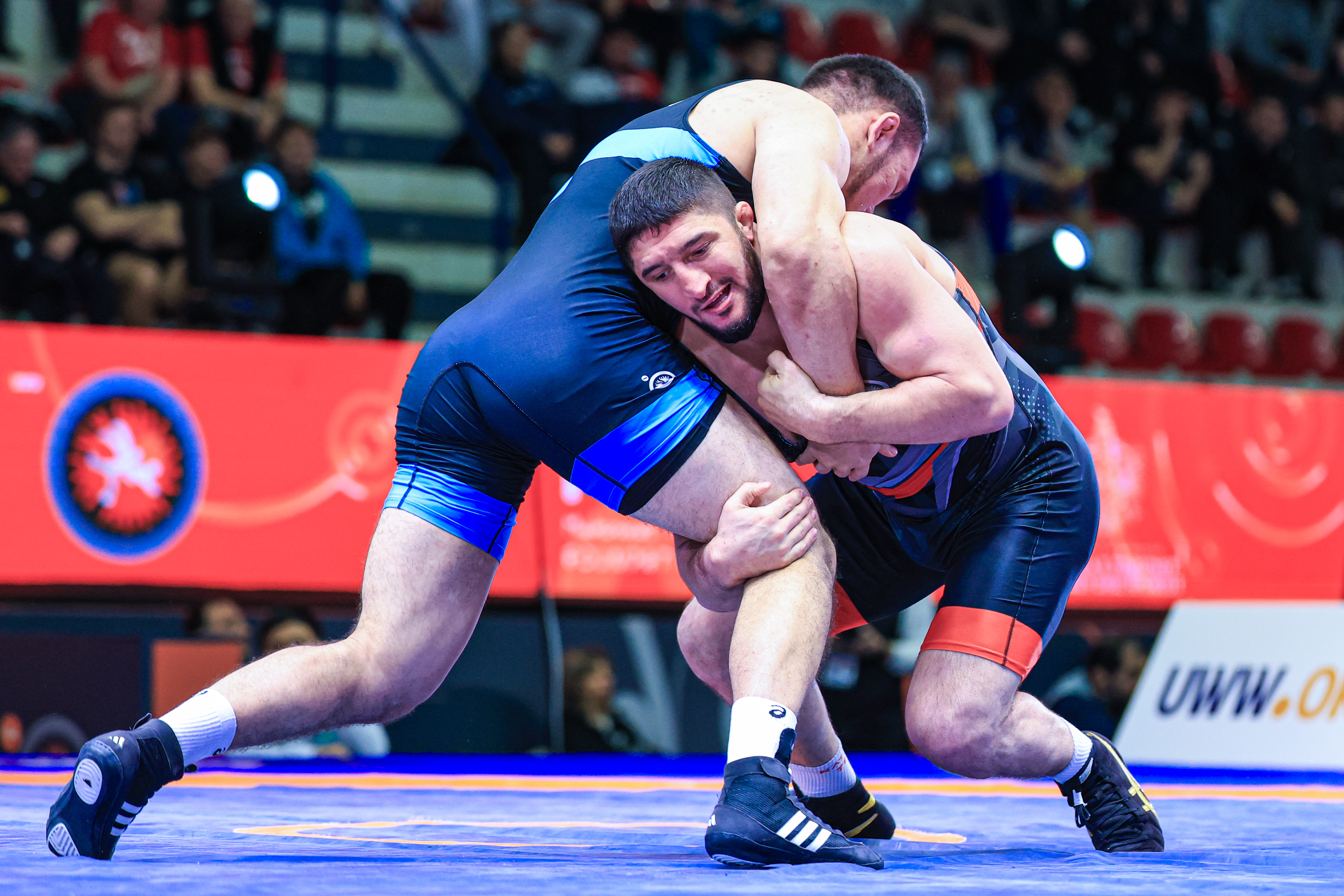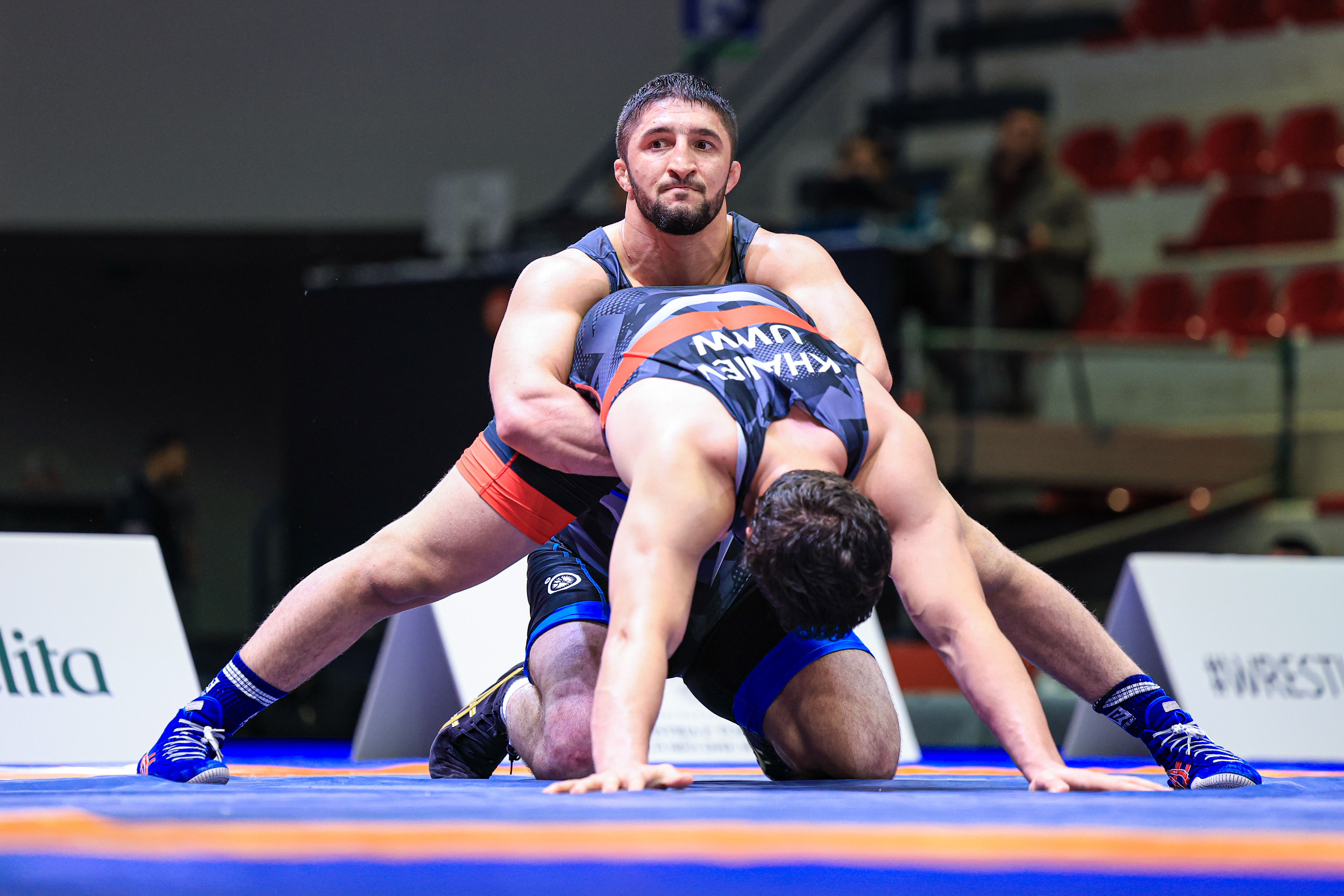TIRANA, Albania (February 26) -- World champion Kyle SNYDER (USA) could have challenged him. Up-and-coming Mukhamed KHANIEV (UWW) could have caused trouble. Or maybe Rizabek AITMUKHAN (KAZ) would have caused an upset.
None of that happened. A calm and composed Abdulrashid SADULAEV (UWW) marked his return to the mat with yet another gold medal, winning the 97kg weight class at the Muhamet Malo Ranking Series event on Thursday in Tirana, Albania.
It has become increasingly rare to see Sadulaev internationally, but when he does wrestle, everyone watches him humble his opponents one by one. Sadulaev last wrestled internationally at the same Feti Borova Arena in Tirana in October 2024 when he claimed his sixth world title, stunningly dropping to 92kg.
After 15 months, he was back at 97kg and at the top of the podium.
"Thank you to everyone who supported me, those in the arena and those watching on TV and smartphones," Sadulaev said. "Everyone who cheered, worried, and prayed for me. I want to say a huge, heartfelt thank you to all of you."
 Abdulrashid SADULAEV (UWW) completes a fireman's carry move. (Photo: United World Wrestling / Amirreza Aliasgari)
Abdulrashid SADULAEV (UWW) completes a fireman's carry move. (Photo: United World Wrestling / Amirreza Aliasgari)
When Sadulaev stepped on the mat on Thursday, he rolled back the years. Right hand on his opponent's forehand, circling while standing tall. He would throw himself back if someone tried to attack his legs and then get a front headlock to score.
A true throwback in Tirana would have been a Sadulaev and Snyder clash but Khaniev decided to postpone that for now by beating the United States wrestler in the quarterfinals. Sadulaev got Khaniev in the final.
He was the first on board with a double-leg attack which gave him four points. He then made Khaniev toil hard to find an opening and when he did, Sadulaev defended like a rock and Khaniev was able to score only stepouts. Khaniev scored four of them while Sadulaev added three more takedowns to finish the final 10-4.
While the gold medal was a satisfactory result for Sadulaev, it was the added incentive that he was chasing.
"For me, this gold means qualifying for the European Championships, which will take place here in this same arena in two months, in April. It was very important for me to qualify there," he said.
Sadulaev, if he competes, will be at the European Championships after six years having last competed at the tournament in 2020. He won gold medal at 97kg in Rome.
 Abdulrashid SADULAEV (UWW) scores on Mukhamed KHANIEV (UWW) in the 97kg final in Tirana. (Photo: United World Wrestling / Amirreza Aliasgari)
Abdulrashid SADULAEV (UWW) scores on Mukhamed KHANIEV (UWW) in the 97kg final in Tirana. (Photo: United World Wrestling / Amirreza Aliasgari)
The final against Khaniev was a virtual wrestle-off to win the spot for the continental championships, to be held from April 20 to 26. And despite beating Khaniev, Sadulaev was all praise for the youngster.
"Khaniev is young and promising," he said. "I thought we might meet before the final, but [because of the bracket] we faced each other only in the final.
"I know him well, we train in the same region, we’ve been at training camps together and worked side by side. He’s very tough, with a really good stamina. He hasn’t gained that much experience yet, but I believe he has everything ahead of him."
Khaniev, making his debut at 97kg internationally, sprung a surprise when he defeated Snyder 10-4, using some crafty counters in the second period. He also defeated Magomedov in the semifinals.
However, Sadulaev isn't reading much into Snyder's loss as the U.S. wrestler had lost to Arash YOSHIDA (JPN) in Tirana but went on to win the world gold in September.
"At tournaments like this, he [Snyder] usually doesn’t come in at peak form the way he does for the World Championships or the Olympic Games, where he’s been in his best shape," Sadulaev said. "So this loss doesn’t really say much. Maybe he will win the next World Championships."
The World Championships in Manama, Bahrain is scheduled in October and there is a good chance that both Sadulaev and Snyder will be there. But Sadulaev is hoping for a more decorated field.
"If everything goes well and I make it for the World Championships, four Olympic champions could compete in this weight class [in Bahrain] -- Hassan YAZDANI (IRI), Kyle [SNYDER] and Ahmed TAZHUDINOV (BRN) and myself, and other medalists," he said. "I think it will be the most competitive and exciting weight category."
Sadulaev, in his subtle humor, would go on.
"It’s hot enough there [Bahrain], but I think at the World Championships, it will be even hotter."



 Abdulrashid SADULAEV (UWW) completes a fireman's carry move. (Photo: United World Wrestling / Amirreza Aliasgari)
Abdulrashid SADULAEV (UWW) completes a fireman's carry move. (Photo: United World Wrestling / Amirreza Aliasgari) Abdulrashid SADULAEV (UWW) scores on Mukhamed KHANIEV (UWW) in the 97kg final in Tirana. (Photo: United World Wrestling / Amirreza Aliasgari)
Abdulrashid SADULAEV (UWW) scores on Mukhamed KHANIEV (UWW) in the 97kg final in Tirana. (Photo: United World Wrestling / Amirreza Aliasgari)
Share your thoughts.
Comments